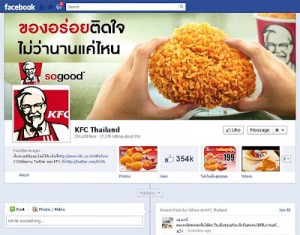 KFC are the latest in a long line of big global brands that have received criticism for inappropriate use of social media advertising.
KFC are the latest in a long line of big global brands that have received criticism for inappropriate use of social media advertising.
Whilst the people of Thailand waited nervously at home to hear whether a mega tsunami on the scale of December 2004 was to strike the fast food giant thought it was appropriate to advertise their products on Facebook as something to watch the news unfold at home with.
Laura Clarke is a blogger with a keen interest in all things social media currently working on behalf of Sentiment Metrics – a company that specialises in social media analytics.
The post caused thousands of complaints from the Thai people who took to web forums to voice their anger. The following day KFC apologised and removed the offending post. Of course this is not the first time multinational brands have used social media and got it terribly wrong.
Kenneth Cole famously used the Cairo uprisings as a shameless way to promote his new spring collection last year when he posted “Millions are in uproar in Cairo. Rumor is they heard our new spring collection is now available online” along with a link to his site. The uproar that resulted was hastily tried to be settled by the posting of two apologies and the removal of the insensitive message. This did not stop someone creating a spoof twitter account for a while posting satirical digs at the designer’s blunder, but has since been closed.
Earlier this year McDonalds came up with the #MCDstories for fans of the fast food chain to tell everyone all about their fantastic experiences at their local McDonalds restaurant. However, the marketing ploy backfired when angry customers also used the hash tag to post their rather unpleasant experiences for all to see too. One customer went as far to say that they would rather eat their own diarrhoea than eat at McDonalds again.
The company tried to save its reputation by saying that out of the 72,000 mentions it got that day only 2% of them were negative, but they still removed the label later that week.
HabitatUK thought a good way to reach more people would be to make use of trending topics, even though they didn’t relate to anything they were tweeting about. They were trying to promote their new spring collection of home wares but used the #Apple as that was a high trending hash tag that day. They soon lost credibility when people picked up on their spammy marketing strategy.
It is hard to believe that in huge companies their social media management strategy leaves a lot to be desired. You would think that company social media profiles were rigidly checked and double checked. But these few examples here show us that unfortunately some blunders are left undiscovered until a media storm ensues.
So there are certainly lessons to be learnt from the mistakes of big companies.
- Never use a national disaster or uprising to promote a product
- If you ask for praise you may get criticism and
- Using trending topics can backfire.
If you remember these three rather simple rules you won’t go far wrong with social media; it’s just a shame multinational companies don’t seem to know that yet!
Laura Clarke is a blogger with a keen interest in all things social media currently working on behalf of Sentiment Metrics – a company that specialises in social media analytics.
